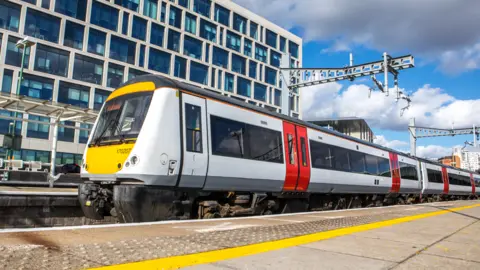Average fares on Welsh-run trains set to fall in 2020
 Richard Jones/MLA Photography/TfW
Richard Jones/MLA Photography/TfWAverage rail ticket prices on services run by the Welsh rail operator will fall in January.
Transport for Wales (TfW) said overall, average fare prices on its services would drop by just over 1% in 2020.
However, some services will still see a rise of 2.8% - in line with retail price inflation, similar to rises on other UK services.
But the passenger group Transport Focus said less than half the rail users it spoke to felt they get value for money.
"January will see the implementation of more affordable rail fares right across the Transport for Wales network," said officials for the operator, which is owned by the Welsh Government.
The rail group said it was cutting fares in north Wales by 7% and in northern valleys lines in south Wales by about 10%.

Many journeys in Wales run by TfW are regulated, which means they are pegged to the retail price index inflation figures (RPI) - which stood at 2.8% in July.
Those under that measure will still see ticket price rises.
For those commuting between Pontypridd or Caerphilly into Cardiff, a seven-day ticket will rise by 2.8% from £25.20 to £25.90.
However, TfW said by capping any rises at a maximum of 2.8%, it was helping fund a £5bn investment to transform the Welsh rail network over the next 14 years.
It includes £738m to transform valley lines to Treherbert, Aberdare, Merthyr Tydfil, Rhymney and Coryton, with 172km of track electrified.
From 2023, the operator said 95% of journeys will be made on new trains - half of them assembled in Wales.
"We're also introducing new rail cards, cheaper off-peak travel, free travel for under-11s and free off-peak travel for under 16s when accompanied by a fare paying adult," said TfW.
Responding to fare announcements across the UK - Transport Focus chief executive Anthony Smith said: "After a year of patchy performance passengers just want a consistent day-to-day service they can rely on and a better chance of getting a seat.
"Transport Focus has long called for a fares system that is simple to use, easy to understand and is flexible enough to cater to how people work and travel today."
